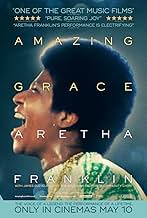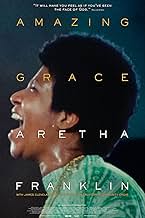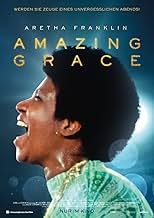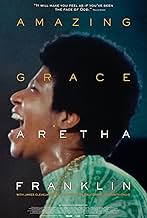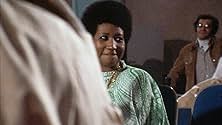Amazing Grace
- 2018
- Tous publics
- 1h 29min
NOTE IMDb
7,5/10
5,3 k
MA NOTE
Un documentaire présentant Aretha Franklin et sa chorale à l'église New Bethel Los Angeles en janvier 1972.Un documentaire présentant Aretha Franklin et sa chorale à l'église New Bethel Los Angeles en janvier 1972.Un documentaire présentant Aretha Franklin et sa chorale à l'église New Bethel Los Angeles en janvier 1972.
- Réalisation
- Casting principal
- Récompenses
- 2 victoires et 15 nominations au total
Aretha Franklin
- Self
- (images d'archives)
James Cleveland
- Self
- (images d'archives)
Alexander Hamilton
- Self - Choir Director
- (images d'archives)
Cornell Dupree
- Self - Guitar
- (images d'archives)
Kenny Luper
- Self - Organ
- (images d'archives)
Poncho Morales
- Self - Percussion
- (images d'archives)
Bernard Pretty Purdie
- Self - Drums
- (images d'archives)
- (as Bernard Purdie)
Chuck Rainey
- Self - Bass
- (images d'archives)
Christine Adams
- Self - The Southern California Community Choir
- (images d'archives)
Alonzo Atkins
- Self - The Southern California Community Choir
- (images d'archives)
Lucy Ayers
- Self - The Southern California Community Choir
- (images d'archives)
James A. Broomfield
- Self - The Southern California Community Choir
- (images d'archives)
Eugene Bryant
- Self - The Southern California Community Choir
- (images d'archives)
Syndrul Drahe
- Themselves - The Southern California Community Choir
- (images d'archives)
Mary Ann Hall
- Self - The Southern California Community Choir
- (images d'archives)
Margerie Luper
- Self - The Southern California Community Choir
- (images d'archives)
Charles May
- Self - The Southern California Community Choir
- (images d'archives)
Esther McIsaac
- Self - The Southern California Community Choir
- (images d'archives)
Avis à la une
To watch this movie is to journey between joy and pain. The joy of being able to hear her voice and see her perform as if it was happening right now. To feel the energy. And then the pain of reality...that she is gone and can not be replaced. I hope that this is just one of many to be made about her life and that future productions include a little more of her off-stage life with some minimal narration and analysis. Still, this rendition is deeply moving and I've been listening to her music ever since watching.
It took me nearly 50 years to see this footage. At 72, I wasn't sure I was going to make it. When this album was released, fans of Ms. Franklin flocked to buy it so we could hear her return to her roots: Gospel, not performed on a stage but in the setting where it originated, in two performances gathered at Los Angeles' New Temple Missionary Baptist Church. In the liner note was the teasing notation, "filmed by Warner Brothers," and it was maddening (in days long before the Internet) not to be able to find out when and where it would be released as a film.
Decades later we learned that it was impossible--with technology available then--to sync up the sound with the film footage and the project had been permanently shelved. The young director, Sydney Pollack, hadn't realized each reel needed a time clapboard for editors to find their way in assembling the footage to properly slate with the live sound recording. Not only that, but Franklin never wanted the film footage to be released (there was heavy post-editing in the audio's final release). So it was with a thunderbolt when we heard people had been working frame by frame to put the sound back in sync with the images (when you watch the film, just imagine what it would be like for an editor to be handed a 10 minute reel and be told "guess where this fits in"; and Pollack used 5 cameras to catch all that was going on with a reported 20 hours of unmarked footage).
It's a miracle to have this film in any form, and not only that but that the director(s) stayed out of the way of what was happening, no fancy edits, or commentary. Nothing but this woman transcending herself and her audience into spiritual ecstasy.
The album only hints at what we finally get to experience. But any performance, much less an entire concert by Ms. Franklin from this era is a gift. She's at her peak and her naturally shy demeanor that masks one of the greatest voices in history peels away and without histrionics or showmanship, she becomes an instrument of her faith. It's exhausting to watch; and, if you're so inclined, transforming.
While the filmmakers handle all of this beautifully, the participants intrude (as they do on the recording), trying to upstage the central reason for this performance. Both the Reverends James Cleveland and her father, C.L. Franklin nearly maul Ms. Franklin either physically or with obsequious lengthy praise. In fairness they have every right to show their pride, but it lessens them. (The choir director, Alexander Hamilton serves the evening much better with his graceful shaping of the choir that's almost a dance but it doesn't distract from the either the soloist or the choir.)
Aretha Franklin, with unparalleled poise and professionalism endures it all without a flinch. She's there to do a job, seems oblivious to the cameras, while using a vocal instrument with a power not seen before or since.
Decades later we learned that it was impossible--with technology available then--to sync up the sound with the film footage and the project had been permanently shelved. The young director, Sydney Pollack, hadn't realized each reel needed a time clapboard for editors to find their way in assembling the footage to properly slate with the live sound recording. Not only that, but Franklin never wanted the film footage to be released (there was heavy post-editing in the audio's final release). So it was with a thunderbolt when we heard people had been working frame by frame to put the sound back in sync with the images (when you watch the film, just imagine what it would be like for an editor to be handed a 10 minute reel and be told "guess where this fits in"; and Pollack used 5 cameras to catch all that was going on with a reported 20 hours of unmarked footage).
It's a miracle to have this film in any form, and not only that but that the director(s) stayed out of the way of what was happening, no fancy edits, or commentary. Nothing but this woman transcending herself and her audience into spiritual ecstasy.
The album only hints at what we finally get to experience. But any performance, much less an entire concert by Ms. Franklin from this era is a gift. She's at her peak and her naturally shy demeanor that masks one of the greatest voices in history peels away and without histrionics or showmanship, she becomes an instrument of her faith. It's exhausting to watch; and, if you're so inclined, transforming.
While the filmmakers handle all of this beautifully, the participants intrude (as they do on the recording), trying to upstage the central reason for this performance. Both the Reverends James Cleveland and her father, C.L. Franklin nearly maul Ms. Franklin either physically or with obsequious lengthy praise. In fairness they have every right to show their pride, but it lessens them. (The choir director, Alexander Hamilton serves the evening much better with his graceful shaping of the choir that's almost a dance but it doesn't distract from the either the soloist or the choir.)
Aretha Franklin, with unparalleled poise and professionalism endures it all without a flinch. She's there to do a job, seems oblivious to the cameras, while using a vocal instrument with a power not seen before or since.
The thing that marks out this spectacularly honest documentary is Aretha Franklin's melancholia.
It's as if she's been transported there by another being. Her God? She is so in the moment. So devoid of ego, unlike her entourage, as to make it a truly 'religious' experience, not just for her but for the viewer too.
The melancholia manifests itself as a lost look. Separated from the action, the film making onluy there for one reason. To sing.
And there is zero theatrics. Zero showmanship. Zero BS.
Just an honest to goodness outpouring of singing as best as she can muster and her best will just have to be good enough. Cos that's all she's got.I've never seen a music documentary so compellingly believable about the motivations of its maker, that motivation appears to be the love of her God and her fellow humankind.
It's quite remarkable.
It's as if she's been transported there by another being. Her God? She is so in the moment. So devoid of ego, unlike her entourage, as to make it a truly 'religious' experience, not just for her but for the viewer too.
The melancholia manifests itself as a lost look. Separated from the action, the film making onluy there for one reason. To sing.
And there is zero theatrics. Zero showmanship. Zero BS.
Just an honest to goodness outpouring of singing as best as she can muster and her best will just have to be good enough. Cos that's all she's got.I've never seen a music documentary so compellingly believable about the motivations of its maker, that motivation appears to be the love of her God and her fellow humankind.
It's quite remarkable.
This reviewer may be one of the biggest Aretha Franklin fans ever. It is unquestionable also that Franklin was the most important Female Artist of the 60's going into the 70''s. So naturally when it was announced that they would finally be releasing the concert film of " Amazing Grace" I was beyond excited. "Amazing Grace" documents the recording of her multi platinum album of the same name. It's not a secret that Aretha Franklin came from Gospel. It was the basis for everything she did. "Amazing Grace" to this day stands as the bestselling gospel album of all time and her bestselling album.
Director Sidney Pollack was hired to document this recording. This film at times seems unfinished or one big revival but that's not why you should buy a a ticket. You're watching sheer talent at hand - raw, unadulterated talent given by God. Aretha in her element joined by the California Community Choir and The Reverend James Cleveland provide the audience a spiritual elevation. This movie isn't about cinematic perfection; it's about touching your soul. Some of my favorite moments are her rendition of "Mary Won't You Weep" and her mash-up of "Precious Lord, Take My Hand, and You've Got Friend" made famous by James Taylor. Only Aretha could turn a secular song and incorporate it into a gospel hymn.
Aretha like most artists of her caliber was a perfectionist and didn't want the movie to be released while she was alive, but I'm glad that her family differed in her view. There is a whole generation that never got to experience this Aretha and now they can.
You will get a chance to see her Father the Reverend C.L Franklin and the tight bond they shared. There are also other celebrities in the building such as Clara Ward, and if you pay close attention, an enthusiastic Mick Jagger is sitting in the back.
This movie is a reverence to a time when black America was no longer defining itself by white standards but firmly standing in its blackness. Aretha was our queen and the church our foundation. She was our refuge our joy our Amazing Grace. All hail the Queen.
Diversity: This movie gets a ten. It doesn't get any blacker than Aretha and gospel music.
Scale: I highly recommend this movie not because Aretha was my favorite singer but because we could use a little spiritual revival during these dark times. A rousing 8 and Amen.
Director Sidney Pollack was hired to document this recording. This film at times seems unfinished or one big revival but that's not why you should buy a a ticket. You're watching sheer talent at hand - raw, unadulterated talent given by God. Aretha in her element joined by the California Community Choir and The Reverend James Cleveland provide the audience a spiritual elevation. This movie isn't about cinematic perfection; it's about touching your soul. Some of my favorite moments are her rendition of "Mary Won't You Weep" and her mash-up of "Precious Lord, Take My Hand, and You've Got Friend" made famous by James Taylor. Only Aretha could turn a secular song and incorporate it into a gospel hymn.
Aretha like most artists of her caliber was a perfectionist and didn't want the movie to be released while she was alive, but I'm glad that her family differed in her view. There is a whole generation that never got to experience this Aretha and now they can.
You will get a chance to see her Father the Reverend C.L Franklin and the tight bond they shared. There are also other celebrities in the building such as Clara Ward, and if you pay close attention, an enthusiastic Mick Jagger is sitting in the back.
This movie is a reverence to a time when black America was no longer defining itself by white standards but firmly standing in its blackness. Aretha was our queen and the church our foundation. She was our refuge our joy our Amazing Grace. All hail the Queen.
Diversity: This movie gets a ten. It doesn't get any blacker than Aretha and gospel music.
Scale: I highly recommend this movie not because Aretha was my favorite singer but because we could use a little spiritual revival during these dark times. A rousing 8 and Amen.
10monty-64
I saw this film at its world premiere in NY at the NYDoc Fest. The Rev Al Sharpton gave the invocation. And the Great Rev. James Barber further illuminated all of us about the meaning of Arentha's worrying a note. In between was one of the most remarkable, moving, inspiring evenings I have ever spent in any kind of theater ever. Of course, I'm a fan, I do work in the industry, but I'm first a fan of young
Aretha's. There was nothing but grace on the screen and the loving community of church. One is blessed to see this film. Period. I just want to add - I would love to know who the absolute genius was that thought of sending Sidney to film this live recording. He or she should receive an Oscar all his or her own.
Le saviez-vous
- AnecdotesDirector Sydney Pollack was totally inexperienced in shooting music documentary and shot without clapper boards snapping shut at the beginning of each take to help synchronize sound and picture in post-production. As a result of this mistake, even after months of work by experts, the 20 hours of footage couldn't be synchronized with the audio tracks. The choir director from the Watts recordings was brought in to try to lip-read the reels, but after months of work, only about 150 minutes of footage had been matched with sound, none of it adding up to a complete, useable song. Deadlines passed as the "Amazing Grace" album came out in June 1972, selling millions with no synergy. In August, Warner Bros. officially wrote off and shelved the movie. Pollack never gave up on the project, but constantly had other commitments. In 2007, dying of cancer, Pollack finally handed the documentary project over to producer and music enthusiast Alan Elliott.
- Citations
Rev. Franklin: I went in the cleaners one day in Detroit to pick up some clothes, and Aretha had appeared on a recent television show. And she told me, "I saw your daughter Aretha last night." I said, "Yes? How did you like it?" She said, "It was all right. But I'll be glad when she comes back to the church." I said, "Listen baby, let me tell you something. If you want to know the truth, she has never left the church."
- Crédits fousThe film concludes with a 1972-era Warner Bros. ending card, even though WB technically no longer has any ties to the film, to suggest how it would have played out had the project been completed and released when initially intended.
- ConnexionsFeatured in Mark Kermode's Secrets of Cinema: Pop Music Movies (2021)
Meilleurs choix
Connectez-vous pour évaluer et suivre la liste de favoris afin de recevoir des recommandations personnalisées
- How long is Amazing Grace?Alimenté par Alexa
Détails
- Date de sortie
- Pays d’origine
- Sites officiels
- Langue
- Aussi connu sous le nom de
- Amazing Grace - Aretha Franklin
- Lieux de tournage
- Sociétés de production
- Voir plus de crédits d'entreprise sur IMDbPro
Box-office
- Montant brut aux États-Unis et au Canada
- 4 450 456 $US
- Week-end de sortie aux États-Unis et au Canada
- 57 353 $US
- 9 déc. 2018
- Montant brut mondial
- 7 796 112 $US
- Durée1 heure 29 minutes
- Couleur
- Rapport de forme
- 1.78 : 1
Contribuer à cette page
Suggérer une modification ou ajouter du contenu manquant

Lacune principale
By what name was Amazing Grace (2018) officially released in India in English?
Répondre






